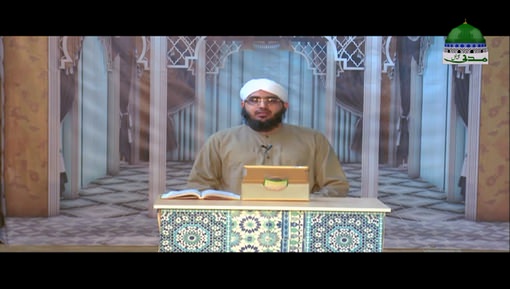Explanation of Hadith
Upon Mustafa, the Paragon of Mercy, Be Countless Greetings
Mawlana Muhammad Nasir Jamal Attari Madani
The final Prophet of Allah صَلَّى الـلّٰـهُ عَلَيْهِ وَاٰلِهٖ وَسَلَّم stated:
اِنَّمَا بُعِثْتُ رَحْمَةً
“I was sent as a mercy,” (Muslim, p. 1074, Hadith 6613).
Allah Almighty sent His final Prophet صَلَّى الـلّٰـهُ عَلَيْهِ وَاٰلِهٖ وَسَلَّم as a mercy to the universe, and it is this mercy that the Beloved Prophet صَلَّى الـلّٰـهُ عَلَيْهِ وَاٰلِهٖ وَسَلَّم is referring to in this hadith.
Unique Mercy
To truly appreciate the nature of the Beloved Prophet صَلَّى الـلّٰـهُ عَلَيْهِ وَاٰلِهٖ وَسَلَّم as a mercy and his role as a paragon of hope, we have to assess the state of people in Arabia and beyond before his advent. That pre-Islamic period was engulfed in immorality, marked by disbelief, and steeped in ignorance. The light of knowledge, probity, and virtue had been reduced to all but a dim flicker amid the overwhelming darkness of hedonism. In that dark moment of human history, the Muhammadan light burst over the horizon of mankind, cleaving asunder the clouds of ignorance, casting rays of hope and mercy over all realms and their denizens. This paragon of compassion صَلَّى الـلّٰـهُ عَلَيْهِ وَاٰلِهٖ وَسَلَّم embodied unmatched mercy towards humans, animals, angels, jinn, animate beings, and inanimate objects—nothing remains in the universe except it has been drenched in the Muhammadan mercy. He صَلَّى الـلّٰـهُ عَلَيْهِ وَاٰلِهٖ وَسَلَّم invited mankind to the truth and laid a clear path for them to Allah’s proximity and the ever-so-sweet nectar of faith.
Allah Almighty granted a distinct excellence to the mercy of the Beloved Prophet صَلَّى الـلّٰـهُ عَلَيْهِ وَاٰلِهٖ وَسَلَّم by giving the believers and obedient followers the glad tidings of success in this life and the Hereafter, (Tafseer Kabeer, vol. 8, p. 193, summarised).
Glimpses into Muhammadan Mercy
Allah Almighty sent His Messenger صَلَّى الـلّٰـهُ عَلَيْهِ وَاٰلِهٖ وَسَلَّم to convey the message of Divine Oneness (tawhid) and to illuminate the path for aspirants of truth. In this matter, the rays of his mercy and compassion radiate in every aspect.
On one occasion, the final Prophet صَلَّى الـلّٰـهُ عَلَيْهِ وَاٰلِهٖ وَسَلَّم said three times, “Allah Almighty has preferred ease for this nation and has disliked hardship,” (Mu’jam Kabeer, vol. 20, p. 298, Hadith 707). His blessed conduct was such that Sayyidatuna Aisha al-Siddiqa رَضِیَ الـلّٰـهُ عَنْھَا states, “Whenever the Beloved Prophet صَلَّى الـلّٰـهُ عَلَيْهِ وَاٰلِهٖ وَسَلَّم was given the choice between two matters, he would choose the easier matter as long as it did not entail sin, but if the easier option was a sin, then he was the furthest from it from among the people,” (Bukhari, vol. 4, p. 133, Hadith 6126).
Moreover, if there was a risk of the Ummah falling into hardship due to certain things, he would not command them to be carried out. For example:
1. Due to his concern for the physically weak, the ill, and the working people in the Ummah, he did not delay Isha salah till a third of the night had passed.
2. Considering the needs of people, especially the elderly and children, he advised Imams to avoid prolonged recitations in salah.
3. He صَلَّى الـلّٰـهُ عَلَيْهِ وَاٰلِهٖ وَسَلَّم did not always offer supererogatory salah at night lest the Ummah is obligated to offer it.
4. Out of concern that the Ummah would fall into hardship, he صَلَّى الـلّٰـهُ عَلَيْهِ وَاٰلِهٖ وَسَلَّم forbade them from observing perpetual fasting (sawm-e-wisal).[1]
5. He صَلَّى الـلّٰـهُ عَلَيْهِ وَاٰلِهٖ وَسَلَّم did not declare Hajj to be fard every year, as it would be difficult for the Ummah.
6. Whilst displaying mercy to the Ummah, he صَلَّى الـلّٰـهُ عَلَيْهِ وَاٰلِهٖ وَسَلَّم gave the command to perform raml only in the first three rounds of tawaf; not in all of them.
7. The Beloved Prophet صَلَّى الـلّٰـهُ عَلَيْهِ وَاٰلِهٖ وَسَلَّم remained engaged in worship throughout the entire night, pleading in the court of Allah Almighty for the forgiveness of the Ummah, to such an extent that his blessed feet would begin to swell due to standing for so long, (Sirat-ul-Jinaan, vol. 5, p. 267, summarised).
Even in the plains of the Day of Judgement when each soul, even the prophets, will be concerned about his own salvation, the Beloved Prophet صَلَّى الـلّٰـهُ عَلَيْهِ وَاٰلِهٖ وَسَلَّم will be concerned only about his nation. He صَلَّى الـلّٰـهُ عَلَيْهِ وَاٰلِهٖ وَسَلَّم will take them, even the sinners, into his refuge, and plea to Allah for their forgiveness and salvation.
Let now be a moment of reflection for each one of us; let us examine our states: By Divine Grace alone, we have the privilege of being from a nation whose leader is brimming with mercy and ever watchful over his followers. Yet, do we reciprocate his mercy and love for us? The follower of the Beloved Prophet صَلَّى الـلّٰـهُ عَلَيْهِ وَاٰلِهٖ وَسَلَّم should be a mirror of the Muhammadan character, merciful towards creation, moved by the fear of Allah to fulfil duties, devoted to the Companions and Ahl al-Bayt, reliable and punctual, knowledgeable about this glorious faith, modest, truthful, hard-working, constantly improving his behaviour, and always striving to ameliorate his heart and state.
May Allah Almighty allow all of us to live our lives under the merciful protection of the Beloved Prophet صَلَّى الـلّٰـهُ عَلَيْهِ وَاٰلِهٖ وَسَلَّم.
اٰمِیْن بِجَاہِ النَّبِیِّ الْاَمِیْن صَلَّی اللہ تَعَالٰی عَلَیْہِ وَاٰلہٖ وَسَلَّم
[1] This refers to keeping another fast without performing Iftar of the previous one, and fasting continuously in this manner.

















Comments